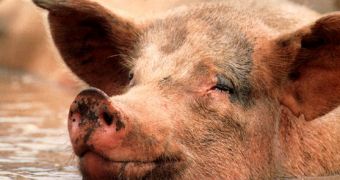Following its coming face to face with an unprecedented air pollution spike, China must now figure out a way to keep water quality in Shanghai well under control.
This is because, as of recently, dead pigs have been showing up in the waters of the Huangpu River, which happens to run precisely through said urban area.
Information made available to the general public says that, according to investigations carried out by health inspectors and people working for the country's high officials, the dead animals came from the Zhejiang province.
However, nobody can say for sure how it was that the pigs ended up in the Huangpu River and later on in Shanghai's Songjiang district.
Preliminary reports stated that the number of pigs found floating in said Chinese waterway amounted to roughly 900.
However, South China Morning Post informs us that it was only recently when Chinese officials admitted that about 1,200 had in fact been found floating in the Songjiang district section of the Huangpu River.
According to the same source, the district environmental official for the aforementioned district believes that, “The number is expected to rise as there are still six barges that have not returned from collecting carcasses.”
Despite the fact that these pigs have already begun to decompose, specialists working with Shanghai's Water Resources Department maintain that the city's residents must not yet worry about the quality of local tap water.
Apparently, this is because tests carried out thus far indicate that the water is still safe to drink, and because specialists working with the city's Water Resources Department intend to continue keeping a close eye on the situation.
Rumor has it that the pigs come from a village in Jiaxing city, and that they died because of some mysterious illness.
However, Chinese high officials maintain that there is no evidence to support the theory that the country is in fact dealing with an animal epidemic that might end up affecting people.

 14 DAY TRIAL //
14 DAY TRIAL //